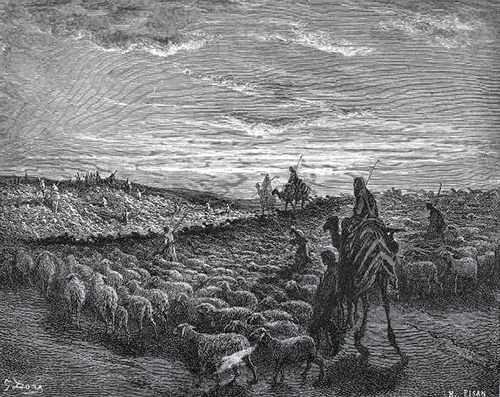
While the words of the Torah itself can be difficult to decipher, it is sometimes an even greater challenge to understand that which is not written at all. Such is the task that faces Biblical commentators in the beginning of Parshat Lech Lecha. The Parsha opens with God’s first commandment to Avram, in which Avram is told to leave his father’s home, his birthplace and country in order to travel to a land that God promises to show him. It is curious that the Torah omits any information regarding God’s decision to choose Avram as well as any information regarding what motivated Avram to embrace the concept of monotheism. The question is strengthened when considering the fact that the Torah does record a limited description of why Noah was chosen by God to build the ark, since he, “found favor in the eyes of the Lord” (Genesis 6:8). Even such sparse details are nowhere to be found regarding Avram.
The great 13th century Biblical commentator, Nahmanides (Ramban), offers a practical suggestion. He reasons that including the story behind Avram’s ultimate acceptance of a singular God would have required recording a detailed story about idolatry and the abhorrent practices of the pagans. The Torah is not interested in focusing on matters of idol worship and therefore completely skipped the beginning years of Avram’s life. The Ramban notes that when the Torah speaks about the first idolaters, it does so succinctly without elaborating in greater detail (see Genesis 4:26), a further proof that God is not interested in focusing on pagan practices.
Another approach is offered by the great 16th century Rabbi, the Maharal of Prague. He writes that there is a fundamental difference between the selections of Avram and Noah. Namely, Noah was selected as an individual, and as such, the Torah includes some information related to his particular selection. God wanted us to understand why Noah merited to be saved. Avram however, was not selected as an individual, he was selected to be the progenitor of a great nation. Since Avram was to be the patriarch of a nation, the particular details of his selection are inconsequential. In fact, the Maharal suggests that by withholding the information surrounding Avram’s personal journey, the Jewish People’s connection with God is deepened. This is because God’s love for the nation of Israel is not predicated on any particular action, it is simply a function of God’s primordial decision to select the nation of Israel as His chosen people.
Perhaps there is a third reason why the Torah omits any mention of Avram’s personal journey of faith. By introducing us to Avram through the prism of God’s first commandment to him, the Torah is teaching us a profound lesson that actions speak louder than words. Avram undoubtedly spent years philosophizing the existence of a singular God, yet Avram’s beliefs were not concretized until he hearkened to God’s commandment and left his homeland for the Promised Land. Religious conviction must be coupled with meaningful action. While Torah Judaism focuses on both creed and deed, God’s decision to introduce us to Avram through his actions helps to remind us the importance of developing and refining our faith so that it breeds and facilitates a more meaningful and active relationship with God.
Shabbat Shalom.
Rabbi Zev Goldberg is the rabbi of Young Israel of Fort Lee, a thriving Synagogue of over 120 families nestled in the hills of Fort Lee, NJ. Rabbi Goldberg also teaches 12th grade students at Bruriah High School for Girls.
By Rabbi Zev Goldberg










